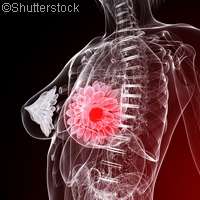Scientists find link between biological processes and young breast cancer patients

Breast cancer in young women is linked to age-related biological processes, a new study shows. Because it is a biologically unique disease, it calls for tailor-made management strategies, researchers reported at the IMPAKT Breast Cancer Conference in Brussels, Belgium from 3 to 5 May. The findings, presented in the journal Annals of Oncology, could impact potential treatment methods, especially because breast cancer in young women is often aggressive and diagnosed at an advanced stage. The prognosis for young patients is not good.
Led by the Institut Jules Bordet in Belgium, the researchers discovered that breast cancer in women aged 45 years or younger is enriched with the aggressive basal-like tumours. These women are also at greater risk of relapse independent of stage, histological grade, breast cancer molecular subtypes and treatment received.
'While some investigators could refer this to poor compliance of young women to hormonal therapies, we performed another analysis in 1 188 women who did not receive any systemic therapy, and indeed, found significant poor outcome in young women both in luminal-A and luminal-B tumours,' said Dr Hatem A. Azim Jr of the Institut Jules Bordet.
Luminal-A cancers are ER+ and low-grade, while luminal-B cancers are ER+ but often high grade.
The team analysed the expression of different genes in women with breast cancer to determine if they correlated with age. In order to consider the tumour size at diagnosis, Dr Azim and his colleagues adjusted the results. They examined whether the disease had spread to lymph nodes, and the breast cancer molecular subtype, as well as other variables.
Their analysis was carried out on two independent data sets, including 1 188 and 2 334 patients. The findings were the same in both cases.
'What we found was that even after adjustment for these parameters, there are several genes and gene signatures that are significantly associated with age in breast cancer patients,' Dr Azim said. 'Some were highly expressed in young women - including stem cells, luminal progenitors, RANK-ligand (RANKL) and c-kit - while others were down-regulated, such as genes related to programmed cell death, or apoptosis.'
According to the researchers, various signalling pathways in the breast cancers of young women could be potential targets for treatment. A case in point is a gene signature of the phosphoinositide 3-kinase molecular pathway closely linked with young age.
'PI3k is an important targetable signalling pathway in breast cancer and perhaps these results could encourage investigating its role in breast cancer arising in young women,' Dr Azim explained.
Another gene, RANKL, is also highly expressed in young breast cancer patients. Experts say this gene contributes to bone metastasis. Based on the results of emerging preclinical data, RANKL appears to have an anti-tumour effect besides contributing to the spread of bone cancer.
'Putting all the information in context, we hypothesise that perhaps targeting RANKL could be particularly interesting in young breast cancer patients,' Dr Azim concluded.
More information: Annals of Oncology: annonc.oxfordjournals.org/














